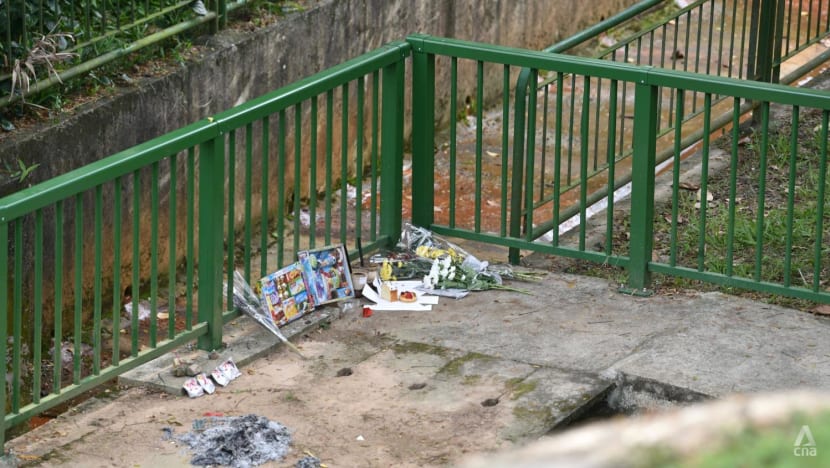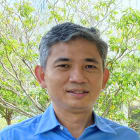Commentary: Greenridge Crescent case will weigh on parents of children with special needs for a long time to come
Parents of children with disabilities have all felt a sense of anxiety about what happens when they outlive us. The Greenridge Crescent deaths are a reminder that more support is needed, says St Andrew’s Autism Centre CEO and caregiver Bernard Chew.

Flowers and offerings seen along the canal of Greenridge Crescent on Jan 24, 2021. (Photo: Jeremy Long)
SINGAPORE: It’s with a heavy heart that I, like many fellow parents of children with special needs, followed the news on the Greenridge Crescent killings. On Aug 15, Xavier Yap Jung Houn was sentenced to 14 years’ jail for strangling his 11-year-old twin sons, who had autism.
We learnt that he was driven by the desire to relieve his wife’s burdens and by fears that no one would care for them after his and her deaths.
Common across caregivers of persons with disabilities (PWDs) or special needs I’ve spoken to was how much we could identify with what Mr Yap was thinking and feeling. It’s no excuse for violence, but each parent has experienced, to varying degrees, a similar despondency.
The stress of relentless caregiving demands; the feelings of isolation that often result from real or perceived inadequate support from the system and the community (sometimes even our own families); the internal struggle of fully accepting the dreams all parents have for their children may never be; the recurrent anxiety about what happens when they outlive us - they all add up and can break even the strongest among us.
Anxiety, depression and a host of other mental health conditions are common among PWDs and caregivers. In a way, this can sometimes be as disabling as the challenges of disabilities themselves.
Fellow caregivers need not suffer alone. There are many support groups in Singapore, and those who have walked the journey before us are ready to share practical advice or simply listen.
WHAT CAREGIVERS OF PEOPLE WITH SPECIAL NEEDS WANT MOST
But what all caregivers really want most is for our children to be adequately supported and welcomed into the community.
Adequate support for our children means person-centred services across each life stage, from early intervention and school to post-school and all the way to the end of life. Of particular concern is the post-school landscape and the dreaded “cliff effect" when children leave the more structured and sheltered schooling environment around the age of 18 to 21.
Efforts to improve the support in special education (SPED) and general education schools, though not perfect (especially for those with less visible needs), need to be at least mirrored in workplaces and Institutes of Higher Learning.
Securing sustained employment remains a challenge. The dignity of work allows PWDs to give back to society in ways they can and every work-capable PWD should be given every opportunity to be employed.
Even with government assistance such as the Enabling Employment Credit that provides wage offsets, employers must want to be inclusive and be willing to implement needed accommodations (such as job redesign and role customisation) to tap on PWDs’ strengths. Supervisors and colleagues must understand the unique differences of different forms of disabilities when working alongside them.
Nationally, an area worth focusing on is enabling social enterprises already keen on hiring PWDs to scale up the provision of supported employment for those not ready for open employment.
For those who are not work-capable and whose needs are more complex, currently available options are Day Activity Centres and sheltered workshops that provide training for daily living skills or vocational skills respectively.
But accessibility, affordability and staffing adequacy weigh on parents’ minds.
Many parents take on fully the burden of care when their children graduate, because of centre capacity or cost as fees can be in excess of S$2,000 (US$1,475) a month. PWDs who need but cannot access these services often regress quickly, seriously affecting their and their caregivers’ quality of life.
Who can help with lifelong support for special needs kids? Listen to CNA's Heart of the Matter:
THE RESPONSIBILITY OF LIFELONG SUPPORT
The hard question that no parent can ignore is who will take over the lifelong care when we are no longer capable or around to do so.
A continuum of residential models is needed to settle adults with disabilities into long-term communal living facilities, such as adult disability homes and disability hostels. The government and Social Service Agencies (SSAs) of course play a key role in delivering such services.
Again, resource constraints are the main challenge. The long-term nature of their stay means there isn’t enough space to meet long-term demand. Service models may not optimise quality of life or community integration if there aren’t enough care staff to ensure safety and run programmes for engagement.
The centre I run, Saint Andrew’s Autism Centre, is not able to cater to every adult with autism who needs our residential or non-residential services. Regrettably, our limited resources sometimes lead to applicants being rejected. A check on SG Enable’s website shows a wait time ranging from one month to five years in some centres.
Resource constraints or not, all SSA staff invest their hearts and souls into caring for and training adults with disabilities, usually with little fanfare and recognition. There is the added challenge of further training and developing these staff, helping them also manage their own mental well-being and affirming their efforts in making the lives of people with disabilities and special needs better.
.png?itok=Z1ZID082)
AN INCLUSIVE SOCIETY REQUIRES ALL OF US
The community’s critical role in supporting PWDs and their caregivers cannot be overstated.
Just being out and about can be a challenge - they can get lost taking a wrong turn or separated from their caregiver boarding the wrong bus. But we need to ensure that caregivers do not feel that people with disabilities need to be kept at home.
All of us - from operators of public facilities and transport to retail vendors and even the man in the street - can help make greater accommodations.
The National Library Board (NLB) and Land Transport Authority (LTA) are making strides in making our public libraries, MRT stations and bus interchanges more inclusive. St Andrew’s Autism Centre is working with Frasers Property Singapore to educate and train mall retail tenants and F&B staff in fundamental ways to include persons with autism.
Corporate efforts are growing, though it takes every one of us to make inclusion a daily experience.
Beyond not passing judgment when they cause some disturbance or inconvenience in public, members of the public can offer tangible help, such as volunteering at disability or special needs SSAs or being supportive neighbours. Playing our individual parts in advancing disability inclusion can be costly and effortful, but everyone can make a real difference.
The recently launched Enabling Services Hub in Tampines West Community Club is one effort to help improve community access and engagement, but a whole-of-society effort is needed to prevent social isolation of people with disabilities and special needs and their caregivers.
MORE STILL TO BE DONE FOR DISABILITY INCLUSION
Progress has undoubtedly been made in the last decade in efforts to make Singapore more disability-inclusive. But the Greenridge Crescent case (and other less high-profile ones) is unfortunately a sign that much more still needs to be done.
SSAs and policymakers will do well to review the adequacy of current service models and support systems, across different disabilities, across life stages, and importantly, across the entire spectrum of disability severity. Those with more complex needs will need more help, even though resources invested may not produce the same outcomes as for those with less severe needs.
But the long list of areas for improvement should not detract from the hard work and achievements of all connected to the disability sector.
The tragic circumstances of this episode will weigh on caregivers, long after the general public turns their attention elsewhere. But we seek not pity or sympathy, only understanding and tangible help.
Take the time to hear our stories of heartbreak and sorrow, but also our stories of hope, faith and love. Despite the challenges, we love our children and we long for a Singapore that loves them just as much.
Bernard Chew is father to two teenage children with special needs, and CEO of St Andrew’s Autism Centre, an agency that works with persons with autism across the lifespan.










.png?itok=YylxJ-Fg)







